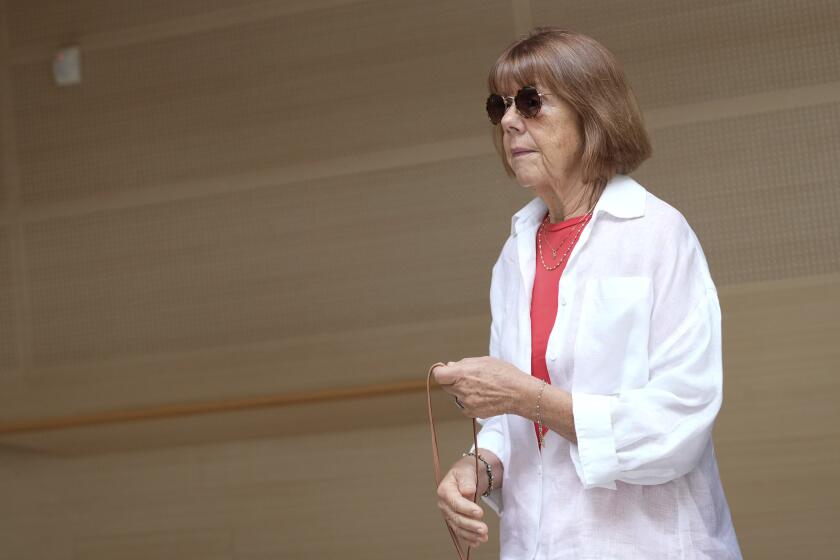Eberhardt Rechtin, 80; Helped Develop U.S. Space Technology
Eberhardt Rechtin, who played a key role in the development of space technology during the Cold War, died Friday at Torrance Memorial Hospital after lengthy battles with several illnesses. He was 80.
Rechtin, of Rolling Hills Estates, was chief executive of El Segundo-based Aerospace Corp. for 10 years, chief engineer of Hewlett-Packard Corp. and director of the Pentagon’s Defense Advanced Research Projects Agency, among other positions that placed him at the forefront of U.S. national security. He later joined the faculty at USC, creating the school’s first program in aerospace architecture.
For the record:
12:00 a.m. April 19, 2006 For The Record
Los Angeles Times Wednesday April 19, 2006 Home Edition Main News Part A Page 2 National Desk 1 inches; 32 words Type of Material: Correction
Rechtin obituary: The obituary of Eberhardt Rechtin in Tuesday’s California section said David Packard was secretary of Defense when he met Rechtin during their tenure at the Pentagon. Packard was deputy secretary.
“He felt his time in public service had been a privilege,” said Albert Wheelon, a close friend for nearly five decades and a fellow aerospace industry leader. “There was never a careerist view of his work. He was a selfless person.”
Rechtin’s most important single technical accomplishment was his role in creating the Deep Space Network, a system developed at the Jet Propulsion Laboratory that captures communications from distant planetary spacecraft.
Although it may seem routine now to see photos from the surface of Mars on television, the network required the solution of huge technical problems in the 1960s. Not only were signals extraordinarily weak after traveling millions of miles through space, but they also had to be captured by a series of receiving stations as the Earth rotated. Ultimately, the network became a critical part of U.S. breakthroughs in planetary science.
“I was told by Nobel Prize winners that it would not be possible really to communicate to the edge of the solar system,” Rechtin recalled in an oral history taken in 1995.
Rechtin also played a key role in the development of electronics systems for the nation’s first space probe, Explorer, while at JPL, Wheelon said.
Rechtin grew up Orange, N.J., and moved to California with his family in 1941. He volunteered for a Navy program that sent him to study at Caltech during World War II.
He graduated in less than three years with an engineering degree and then received a PhD, also from Caltech, in 1950. Among his lecturers was Simon Ramo, who later helped establish the space operations of what is now Northrop Grumman Corp.
“I remember him as a bright young engineer,” Ramo said. “He became a prominent person in the field.”
Rechtin worked at JPL until 1967, when he was named director of the defense research projects agency. One of his first decisions was to cancel a program to develop a mechanical elephant intended to fight in the jungles during the Vietnam War. He later was named an assistant secretary of Defense, helping to oversee defense intelligence operations.
During his years at the Pentagon, he met David Packard, secretary of Defense and a founder of Hewlett Packard who appreciated Rechtin’s technical and scientific qualifications. Packard made him chief engineer of Hewlett Packard in the Silicon Valley. Four years later in 1977, he was named chief executive of Aerospace Corp., the Air Force’s systems engineer and architect for space.
During Rechtin’s tenure, Aerospace revenue tripled and the company came to play a key role in advising the Air Force on such things as the development of the Global Positioning System and the Star Wars missile defense program. He was known for his often candid views, delivering sometimes unwelcome technical advice that offered a dose of reality to promoters of big-ticket defense systems.
Rechtin also “made major strides in advancing the role of minority and women engineers,” said his son Mark Rechtin, a Los Angeles-based reporter for Automotive News.
He retired from Aerospace and joined USC in 1988. He wrote several books on the problem of how to design and develop massive aerospace systems, such as worldwide networks and space stations.
Rechtin was also an accomplished musician, playing the piano, violin and other instruments. On a national security trip to Turkey once, he came back with an oud, a lute-like instrument. He immediately played it with skill, though he had never touched one before, Wheelon said.
Besides his son, Rechtin is survived by his wife of 55 years, Deedee; daughters Andrea Rechtin, Nina Meierding, Julie Rechtin and Erica Bauermeister; four grandchildren; and sister, Joan Lincoln.
A memorial service is planned for 2 p.m. Sunday at the Neighborhood Church in Palos Verdes Estates.
More to Read
Sign up for Essential California
The most important California stories and recommendations in your inbox every morning.
You may occasionally receive promotional content from the Los Angeles Times.











